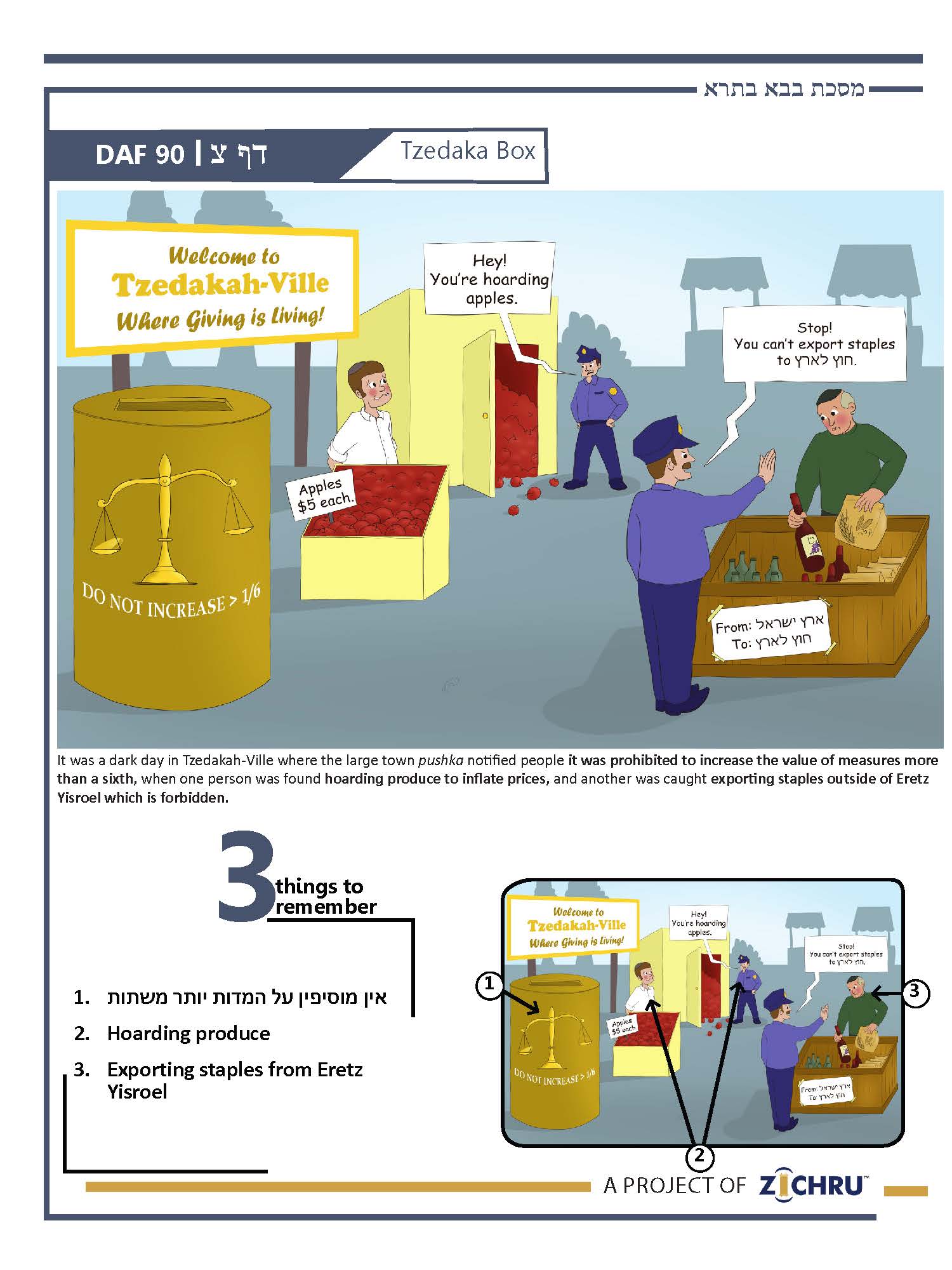Bava Basra - Daf 90
- Audio Timestamps
0:00 - The 3 Sugyos
3:14 - Review of 3 Sugyos
6:11- Siman
8:42 - 4 Blatt Back Chazarah
16:12 - Pop Quiz (Last 7 blatt)
For access to all Zichru resources including PDFs, and illustrations CLICK HERE
- אין מוסיפין על המדות יותר משתות
Shmuel said three rulings: אין מוסיפין על המדות יותר משתות – [A city] cannot increase the sizes of their measures by more than a sixth, ולא על המטבע יתר משתות – nor can they increase the value of coins by more than a sixth, והמשתכר אל ישתכר יותר משתות – and one should not profit through buying and selling by more than a sixth. The Gemara seeks to explain Shmuel’s first ruling, and why a sixth would be permitted. After two suggestions are rejected, the Gemara suggests another: דלא ליהוי פסידא לתגרא – It is so the merchant does not suffer a loss of principal if he mistakenly sells a new measure for the old price (unaware of the increased volume), since a merchant usually profits by a sixth. The Gemara objects that if so, increasing the measure by a sixth should also be prohibited, since he will have no profit: זבן וזבין תגרא איקרי – does he buy and sell merchandise just to be called a merchant, without making any profit?! The Gemara concludes that Shmuel has a source in a passuk that coins (and measures) may be increased by a sixth, despite the possibility that a merchant will not profit. Still, the Rabbis forbade raising it more, whereby a merchant may suffer a loss of principal.
- Hoarding produce
A Baraisa states: אוצרי פירות – Regarding those who hoard produce, who cause prices to rise and take advantage of them, as well as those who lend with ribbis, those who cheat using small איפה measures, and those who raise the prices, the passuk says: נשבע ה' בגאון יעקב אם אשכח לנצח כל מעשיהם – Hashem swore by the pride of Yaakov, “Surely I shall never forget their deeds.” Shmuel’s father would sell early in the market at the early, lower price, and Shmuel would delay selling his produce until the end of the harvest season (when prices were higher), at the early, lower price. Although both were permitted, they sent from Eretz Yisroel: טבא דאבא מדברא – the father’s practice is better than the son’s, because תרעא דרווח רווח – a market price that eased initially, eases for the whole season. A Baraisa states: אין אוצרין פירות דברים שיש בהן חיי נפש – one may not hoard produce which is a staple of life, such as wine, oils, and fine flours, but one may hoard seasoning, such as cumin and pepper. The prohibition is only for buying from the market and hoarding, אבל במכניס משלו מותר – but regarding one who gathers in his own produce, it is permitted. Another Baraisa permits hoarding near shemittahExporting staples from Eretz Yisroel
A Baraisa states: אין מוציאין פירות מארץ ישראל – One may not export produce out of Eretz Yisroel דברים שיש בהן חיי נפש – items which are staples of life, such as wine, oils, and fine flour. Rebbe Yehudah ben Beseira permits exporting wine, מפני שממעט את התיפלה – because it thereby reduces indecency in Eretz Yisroel. The Tanna Kamma adds that similarly, one may not export such produce to Surya, because he does not consider it part of Eretz Yisroel, but Rebbe permits exporting from the last province in Eretz Yisroel to the first province of Surya, since they are so close. On the next Daf, a Baraisa says one cannot trade in staples of life in Eretz Yisroel (buying from a producer and retailing it for a higher price). Rebbe Elazar ben Azaryah did trade with wine and oil in Eretz Yisroel, and the Gemara explains that he held like Rebbe Yehudah ben Beseira regarding wine, and oil was plentiful in his locale, and there was no concern about increasing prices.
Siman – Tzedaka Box
It was a dark day in Tzedakah-Ville where the large town pushka notified people it was prohibited to increase the value of measures more than a sixth, when one person was found hoarding produce to inflate prices, and another was caught exporting staples outside of Eretz Yisroel which is forbidden.


